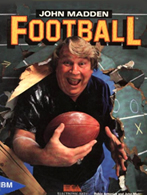No discussion of the legacy and popularity of Electronic Arts’ Madden series is complete without mentioning Scott Orr. Since the very inception of the franchise, he was there for its meteoric rise during the 16-bit era and, as well as its eventual domination of the football genre in the Playstation age. Orr has  been in the games industry for more than two decades, starting out as as the owner of a successful game developer, GameStar (sold to Activision in 1986), which specialized in making games for the Commodore 64. He joined EA shortly afterward, where he oversaw the company’s flagship franchise until his departure in 2001. Currently, Orr owns a company called Sorrent, which develops games for cell phones.
been in the games industry for more than two decades, starting out as as the owner of a successful game developer, GameStar (sold to Activision in 1986), which specialized in making games for the Commodore 64. He joined EA shortly afterward, where he oversaw the company’s flagship franchise until his departure in 2001. Currently, Orr owns a company called Sorrent, which develops games for cell phones.
Under Orr’s guidance, the Madden games have become the dominant force in football games, garnering, to much controversy, an exclusive NFL license that runs through 2013. Regardless of particular preferences, few can deny the influence the series has had in gaming, and Orr was a major part of what has become a staple of gaming.
Sega-16 was fortunate enough to chat with Mr. Orr about his work on the series, beginning with the Genesis original.
Sega-16: You originally began in gaming with a company you founded called GameStar, which was later bought out by Activision. From there you moved on to Electronic Arts. When did you see the Genesis for the first time, and what was your initial impression?
Scott Orr: I first learned about the Genesis from various game publications prior to its release. It was clearly a generational leap in terms of capability and I believed it would revitalize the console business. In fact, I strongly pushed the developer who had worked with me on Monday Night Football for Data East to jump into the 16-bit console business right away. That led to my first fateful meeting with Rich Hilleman in Jan 1990 (see below).
Sega-16: You’ve largely been credited with creating the Madden franchise on consoles, beginning with the original on the Genesis in 1990. However, the late Michael Knox told us that you didn’t come aboard until the second game, and other sources have you coming aboard in 1992. When exactly did you begin work on the franchise?
Scott Orr: Memories are fleeting and it’s a shame Mike passed away so young; he was a great guy. Here’s the full story, which can be verified by any number of people:
- 1989: Designed Monday Night Football for Data East, developed by Park Place Productions (run by Troy Lyndon and Mike Knox who had worked for me at Gamestar in the mid 80’s).
- Jan. 1990: Along with Troy and Mike, I met with EA producer Richard Hilleman at Jan CES to discuss developing a football game for the Sega Genesis.
- Feb./Mar. 1990: Rich contracted with me to lead design the football game, which initially was not even called Madden (but was changed early in the design process). Park Place was contracted to develop the game and hired Jim Simmons as lead programmer.
- Contrary to some rumors, the Genesis version was NOT a port of the 8-bit Apple or PC versions (which were lousy games and sales failures); it was designed and developed from the ground up specifically for the 16-bit Genesis and had no relation to the computer games at all other than the Madden name.
- Nov. 1990: Madden Genesis ships and the rest is history. I’m contracted again to design and Park Place contracted to develop the 1991 version (Madden ’92).
- Mar. 1991: Hilleman persuaded me to join EA as a producer (and give up my Madden royalties in exchange for company options, a big win for me in the long run). I took over responsibility for the Madden franchise as exec producer (1992) and VP production (1993) until 2000, when Tiburon took over franchise ownership.
If I had a dime for everybody who takes credit for designing and/or producing the Madden franchise during the ’90s, I’d be retired by now 😉
Sega-16: How much did the sales of Madden on Genesis encourage management? Early on, it seems like they were just interested in porting computer games. Did Madden change their vision of developing on the Genesis?
Scott Orr: EA’s first venture into console games began with the Genesis and big success with Madden and other sports and action games fundamentally changed the company and led to explosive growth. Prior to that EA was solely focused on computer games and productivity software, which was a relatively small and slow growing market.
Sega-16: Until around 1993, EA really didn’t seem to have competition, as other companies, like Tecmo, were making more arcade-like football games. Did this give you and your team a little breathing room for making improvements or was there always that compulsion to go bigger and better?
Scott Orr: Our goal from the beginning was to give gamers the best football game on market by combining arcade action, a simple interface, smart AI and realistic looking physics. My design/producer bias was always to keep the interface simple but versatile and on creating game play and visual details that made the game incredibly fun and kept it a step or two ahead of the competition.
Sega-16: What did you think of Sega’s NFL Football series? It seemed to have started out slow (as Joe Montana Football) but eventually evolve into a competent rendition of the game.
Scott Orr: Yes, Sega was our strongest competitor and their later games were technically more advanced than Madden though not as much fun to play. The original Joe Montana game was actually developed by Park Place using the Madden game engine (with more limited graphics and game design from Sega).
Sega-16: Many people consider the Genesis versions of Madden to be better than their SNES counterparts, but that’s to be expected from Genesis fans. I’m sure SNES fans consider their versions to be the best. What’s official word, then? Which console gave us the better Maddens?
 Scott Orr: I think the Genesis versions were better due to a more responsive, user-friendly controller and hardware that was easier to program and push technically. Having said that I think the early SNES versions were great SNES games due to the talents of John Schappert, Steve Chiang and their team at Tiburon.
Scott Orr: I think the Genesis versions were better due to a more responsive, user-friendly controller and hardware that was easier to program and push technically. Having said that I think the early SNES versions were great SNES games due to the talents of John Schappert, Steve Chiang and their team at Tiburon.
Sega-16: You stayed with Madden well past the close of the 16-bit era. What was it like bringing the franchise to the Saturn? How was development compared to the Playstation?
Scott Orr: Saturn was challenging but the end result was pretty good, not optimized, but certainly the best football game on the platform. The first Playstation version was a disaster since it didn’t get finished due to developer/resource problems, an overly aggressive schedule and poor technical support from Sony. However, the next year Madden shipped as planned thanks to Tiburon and was not only the #1 sports game but I believe also the #1 game period on the Playstation in 1996.
Sega-16: Many people cite Toughman Contest for the 32X as the closest Sega-based competition to Nintendo’s Punch Out! Boxing series. Were you shooting for that goal? What was the mindset during development? What type of boxing game were you trying to make?
Scott Orr: Yes, we were trying to capture the fun and game play balance of Punch Out! with a fresh look that took advantage of the 32X technology. We clearly fell short of Punch Out!’s legendary success, but I think the game was better than sales would suggest.
Sega-16: People have made comparisons between the Genesis and 32X versions of Toughman, noting that the two look very similar. Was one a direct port of the other? Was it a development issue?
Scott Orr: The Genesis code was the basis for the 32X version with enhancements that took advantage of the better tech. However, since the sales forecasts for the 32X version were quite modest we didn’t have a budget or team to create a new code base from the ground up to optimize the game for the platform.
Sega-16: Did the Knockout Kings series, which your brother worked on, evolve from Toughman? Were there any elements that were first shown in that 32X game?
Scott Orr: No, Knockout Kings (produced by my brother Keith) was an original game design and game engine developed from the ground up specifically for the game.
Our thanks to Mr. Orr for taking the time for this interview.

Recent Comments